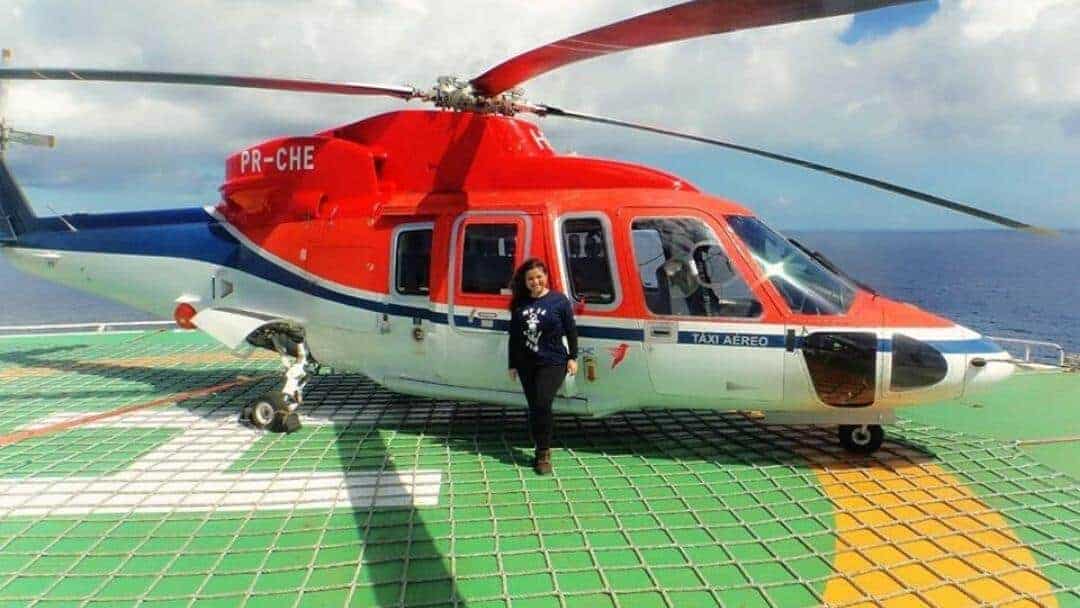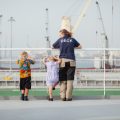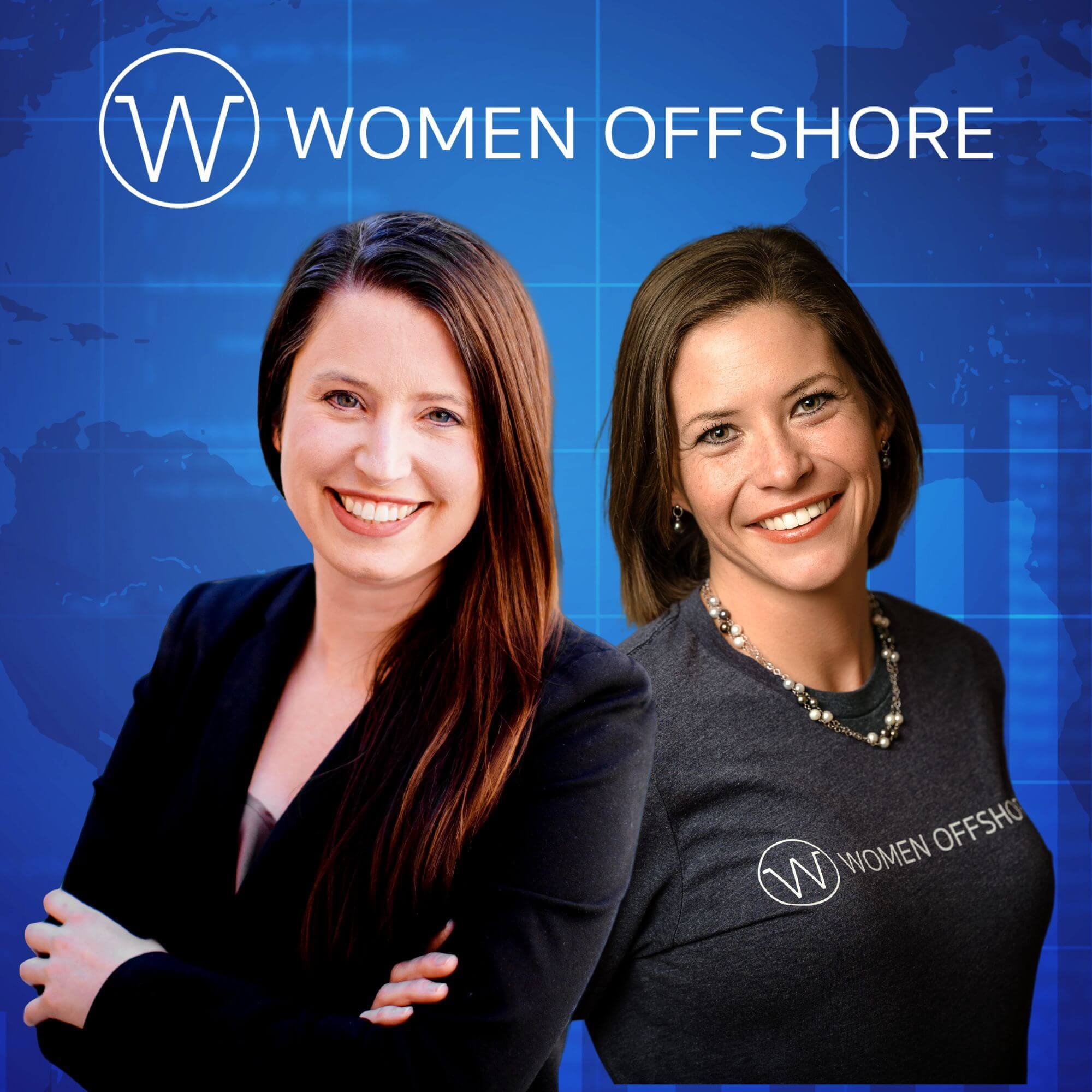Radio Operator sounds reductive. Why not call her a “Communications Expert? or an “International Relations Coordinator?”
With all the communications Maria Quiteria Rego is responsible for as a radio operator offshore, a more dignified title is necessary. Whatever you want to call Maria, it is clear she is revered in her field.
Working for Modec in Brazil as a Bilingual Administrative Assistant and Radio Operator, Maria is responsible for the first contact with any vessel that approaches, whether they are PSVs, tankers, AHTS, DSV, or tug boats. Maria handles all chopper flight communications from approach, touch down, departure to completion. She manages the flights and logistics of crew changes, keeping them up to date with reference to muster lists, and in various software, she manages data regarding the people onboard.
Growing up in Poços de Caldas, Brazil, a city in Southeast Brazil and encircled by mountains, Maria wanted something more for her life and career. At age 14, she moved to a new city, and by 18 she was living in the UK. However while growing up, the sea never crossed her mind as a potential career path.
On holiday in Rio de Janeiro in January 2012, her closest childhood friend visited her with a life changing idea, brandishing a newspaper and piping, “Find a job in Rio and live here! You must get out of the country side. You lived in London for 4 years, and your life must go on.”
Maria was ready for a change, a new path; call it a second coming. By February 2012, she secured her position with Modec as a language instructor and translator in both Portuguese and English. She was hooked on an offshore career after the first hitch.
Eight years later she continues to grow and strives to play a more prominent role in the industry. Maria muses that the sea chose and adopted her.
Her job title further deceives me as Maria shares a story of a particular point in her job that is frequent, unfortunate, but inspirational. “I remember this one time our chief cook’s father passed away. It was Sunday morning, and he came to my office at 0545, Mr. Joao – Chef Joao. He informed me of the situation, and I looked at him thinking, ‘Oh my god, what should I say?!’ I looked straight into his eyes, I held his hands, and I said, ‘May peace be with you and your family, Chef Joao. I know there is nothing I can say that will free you from pain. What I can say is, at least your daddy is not suffering anymore. We who stay alive suffer; he whom has gone is in the light and well. Be strong Chef Joao.’ I hugged him firmly and said, ‘You can count on me.'”
She is a confidante. A communicator doesn’t just talk. They listen, and Maria is an outstanding crew member because she listens with empathy.
“Never lose hope, never regret being good to others, never stop caring, always be thankful…” – Maria Quiteria Rego
Following the correct procedures, Maria made arrangements to disembark Mr. Joao in a matter of hours. She says she was just doing her job.
The following hitch she was indubitably corrected. Chef Joao went above and beyond to demonstrate his gratitude toward her, bringing fresh plates of beautifully carved tropical fruits to her office. “What you did for me I’ll never forget,” he declared. “You did more than your job, you hugged me and the message you gave me made me stronger so I could face what was waiting for me at home. Thank you, Maria.”
This experience reminded Maria of how important and strong the offshore bond is. Our chain of friendship, our anchor of goodness makes us special and unique. “Never lose hope, never regret being good to others, never stop caring, always be thankful and be careful with your words. If words are guns, make sure you only give shots of love!”
What motivates her to continue in the industry? “We produce petroleum; I call it The Black Diamond. How cool is that?” She also echoes a common feeling in mariners, “Our jobs are totally awesome!”
It wouldn’t be fair to say Maria’s role is small, as she is an adhesive; actuating many tasks, connecting all people on board, constantly improving the flow of processes and the people involved. And she is never stagnant. “…there is no career at my current position so right now I’m studying HSE. I intend to have an opportunity to work as a HSE tech/Advisor in 2 years, perhaps.”
HSE (Health, Safety, and the Environment) management is responsible for planning, implementing, monitoring and optimizing operational processes in the areas of environmental management, health protection and occupational safety.
She marvels about the challenges of working at sea. “It’s like opening Pandora’s Box; we never know what to expect.” Perhaps that’s why we love it so much; there’s great adventure in it, high risks, invaluable lessons, a melting pot of feelings. Overcoming all these obstacles while working offshore yields a satisfaction that isn’t nearly as rewarding in any other career. “Being away from home and family is difficult, to get sick at the sea is hard, and [even] to have my period onboard…I don’t know about you ladies, but I’d rather be at home lazing around on my couch watching Netflix and eating popcorn or ice cream, or both.” I’m sure other female mariners can relate.
More women should know the joy and sense of accomplishment that a maritime career grants us. The path is more obvious to men, but less easily accessed by women. How should we go about this? Maria has an easy answer. “We should be able to go to the schools and speak about it. We should also invite these young students to attend our conferences and to learn about it. It’s never too late to be part of this incredible market. Remember, when I got in I was already 30 years old…and I’m still in it. We should be able to talk about it more.” As a communications expert, she nails it. Talk about it more.
When asked what it is about being at sea that forms bonds unlike in any other workplace, Maria eloquently shares, “We are confined at sea, but we are never alone at sea. We are the base for each other, we are family, we are friends, we are kids together playing, we are fighters working hard, and we are warriors because we make it happen, regardless of the difficulties of being confined at sea. When at sea we have to be more human than ever because we never know from whom we are getting help. Always treat people right, respect their limits because you surely have yours. Remember we are all onboard the same ship and if it sinks, we will sink together, so why not enjoy it as much as we can and become better human beings together. Together we are stronger, together we make everything happen. Be bold, be good and believe in your dreams!”







Wow … you Ladies got me crying!!!
God knows how much I’m greatful for being part of Women Offshore Community … it was definitely a game changer in my life!
Ally, you’re always in my heart!
Julie what a marvellous piece about me, thank you so much.
Congratulations, Maria.
It was a great honor and pleasure working with you by my past time offshore.
As Maria’s mother I am here to thank you for the wonderful written piece.
I am so proud of my daughter and I really appreciate when people say such nice things about her. As we quarantine Maria spent 48 days embarked. My other two daughters and I were online for her, although one of them lives in Germany, the other one in Brazil and I myself in the US. She knows she can count on us no matter what. But today I got the sense she can also count on you, wonderful women offshore. From the botton bottom of my heart, thank you very much. May you be blessed wherever you are.
Miss Rosane,
It was truly a pleasure getting to know Maria, and a privilege to write about her. She is one of a kind.
WOW….she should be called :”ANGEL” . A truly remarkable story and career to date. I know she will do well in HSE …it is simply part of her caring nature! Maria is a jewel. As for the author, Julie…thanks for a great story, very well written. Being a lifelong retired Mariner and now 10 years into Therapy Dogs (Newfoundlands) I can understand her nature and insights. Both the author and subject are two very special ladies.
Wow, amazing insight into what Maria believes and what she strives for. I met her once and she changed my outlook on many things. Outstanding person.